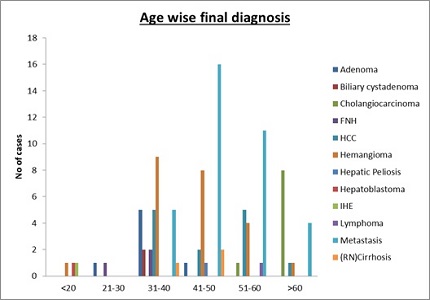Comparison of triple phase ct and ultrasonography findings for evaluation of hepatic lesions
Abstract
Background: Characterizing a hepatic lesion as benign or malignant is essential for correct therapeutic plan and surgical triage. USG plays major role in screening of a liver lesion. Conventional CT with only portal venous phase has certain limitations including its inability to detect lesions which enhances in early arterial phase like HCC and those enhancing in delayed phase like Cholangiocarcinoma. Triphasic CT utilizes three phases and offers a comprehensive and accurate determination.
Design: This prospective study included 100 patients with clinical suspicion of hepatic masses.
Materials and Methods: All patients underwent both USG and triple phase CT, accuracy, sensitivity and specificity of both the modalities were calculated.
Results: USG proved to be a good screening modality with a sensitivity of 82.7% , specificity 95.6 % , PPV 82.7 % and NPV 95.6 % (p value <0.001 , kappa value 0.678) . Triple phase CT is excellent for characterisation and better evaluation of hepatic masses with sensitivity of 91.3%, specificity 97.8 % , PPV 91.3 % and NPV 97.8 % (p value <0.001 , kappa value 0.847). Malignant hepatic lesions can be diagnosed by triphasic CT with accuracy of 93 % , sensitivity and specificity of 93.3 % and 92.5 % respectively and with PPV and NPV of 94.9 % and 90.2 % respectively and by USG with accuracy of 87 % , sensitivity and specificity of 90 % and 82.5 % respectively and PPV and NPV of 88.5 % and 84.6 % respectively.
Conclusion: Ultrasonography must be performed in all patients with clinical suspicion of hepatic masses for initial detection and localisation of lesion. Also it is widely available, less expensive and with no radiation exposure. But in comparison to triple phase CT it has lower sensitivity in differentiating benign hepatic lesions from malignant, determining accurate extension of tumor with vascular invasion.
Downloads
References
2. Abdel-Misih SR, Bloomston M. Liver anatomy. Surg Clin North Am. 2010 Aug;90(4):643-53. doi: 10.1016/j.suc.2010.04.017.
3. MONKHOUSE WS. Last’s anatomy, regional and applied, 10 edn.Edited by C. SINNATAMBY. (Pp. X+539; f35 paperback; ISBN 0 443 05611 0.) Edinburgh: Churchill Livingstone. 1999. Journal of Anatomy. 2000 Oct;197(3):513–8. [PubMed]
4. Foley WD, Mallisee TA, Hohenwalter MD, Wilson CR, Quiroz FA, Taylor AJ. Multiphase hepatic CT with a multirow detector CT scanner. AJR Am J Roentgenol. 2000 Sep;175(3):679-85. [PubMed]
5. Oliver JH 3rd, Baron RL, Federle MP, Rockette HE Jr. Detecting hepatocellular carcinoma: value of unenhanced or arterial phase CT imaging or both used in conjunction with conventional portal venous phase contrast-enhanced CT imaging. AJR Am J Roentgenol. 1996 Jul;167(1):71-7.
6. Atasoy C, Akyar S. Multidetector CT: contributions in liver imaging. Eur J Radiol. 2004 Oct;52(1):2-17.
7. CT and MRI of the whole body, 5th ed, 2-Vol. Set. American Journal of Neuroradiology. 2009 Apr 22;30(7):e103–4.
8. Oto A, Kulkarni K, Nishikawa R, Baron RL. Contrast enhancement of hepatic hemangiomas on multiphase MDCT: Can we diagnose hepatic hemangiomas by comparing enhancement with blood pool? AJR Am J Roentgenol. 2010 Aug;195(2):381-6. doi: 10.2214/AJR.09.3324.
9. Bartolotta TV, Taibbi A, Galia M, Runza G, Matranga D, Midiri M, Lagalla R. Characterization of hypoechoic focal hepatic lesions in patients with fatty liver: Diagnostic performance and confidence of contrast-enhanced ultrasound. European Radiology. 2006 Oct 3;17(3):650–61.
10. Ichikawa T, Federle MP, Grazioli L, Nalesnik M. Hepatocellular adenoma: multiphasic CT and histopathologic findings in 25 patients. Radiology. 2000 Mar;214(3):861-8. [PubMed]
11. Blachar A, Federle MP, Ferris JV, Lacomis JM, Waltz JS, Armfield DR, Chu G, Almusa O, Grazioli L, Balzano E, Li W. Radiologists’ performance in the diagnosis of liver tumors with central scars by using specific CT criteria1. Radiology. 2002 May;223(2):532–9.
12. Kassarjian A, Zurakowski D, Dubois J, Paltiel HJ, Fishman SJ, Burrows PE. Infantile Hepatic Hemangiomas: Clinical and imaging findings and their correlation with therapy. American Journal of Roentgenology. 2004 Mar;182(3):785–95. [PubMed]
13. Keslar PJ, Buck JL, Selby DM. From the archives of the AFIP. Infantile hemangioendothelioma of the liver revisited. Radiographics. 1993 May;13(3):657-70. [PubMed]
14. Levy AD, Murakata LA, Abbott RM, Rohrmann CA Jr. From the archives of the AFIP. Benign tumors and tumorlike lesions of the gallbladder and extrahepatic bile ducts: radiologic-pathologic correlation. Armed Forces Institute of Pathology. Radiographics. 2002 Mar-Apr;22(2):387-413.
15. Palacios E, Shannon M, Solomon C, Guzman M. Biliary cystadenoma: ultrasound, CT, and MRI. Gastrointest Radiol. 1990 Fall;15(4):313-6. [PubMed]
16. Mergo PJ, Helmberger TK, Buetow PC, Helmberger RC, Ros PR. Pancreatic neoplasms: MR imaging and pathologic correlation. Radiographics. 1997 Mar-Apr;17(2):281-301. [PubMed]
17. Lee KH, O'Malley ME, Haider MA, Hanbidge A. Triple-phase MDCT of hepatocellular carcinoma. AJR Am J Roentgenol. 2004 Mar;182(3):643-9. [PubMed]
18. Hepatobiliary and Pancreatic Radiology: Imaging and intervention. Radiology. 1999 Mar;210(3):616.
19. Chung EM, Cube R, Lewis RB, Conran RM. Pediatric liver masses: Radiologic-Pathologic correlation part 1. Benign tumors1.RadioGraphics. 2010 May;30(3):801–26.
20. Bloom CM, Langer B, Wilson SR. Role of US in the detection, characterization, and staging of cholangiocarcinoma. Radiographics. 1999 Sep-Oct;19(5):1199-218.
21. Sainani NI, Catalano OA, Holalkere NS, Zhu AX, Hahn PF, Sahani DV. Cholangiocarcinoma: current and novel imaging techniques. Radiographics. 2008 Sep-Oct;28(5):1263-87. doi: 10.1148/rg.285075183. [PubMed]
22. Foley WD, Kerimoglu U. Abdominal MDCT: liver, pancreas, and biliary tract. Semin Ultrasound CT MR. 2004 Apr;25(2):122-44. [PubMed]
23. Gazelle GS, Lee MJ, Hahn PF, Goldberg MA, Rafaat N, Mueller PR. US, CT, and MRI of primary and secondary liver lymphoma. J Comput Assist Tomogr. 1994 May-Jun;18(3):412-5. [PubMed]
24. Manzella A, Borba-Filho P, D'Ippolito G, Farias M. Abdominal manifestations of lymphoma: spectrum of imaging features. ISRN Radiol. 2013 Sep 2;2013:483069. doi: 10.5402/2013/483069. eCollection 2013.



 OAI - Open Archives Initiative
OAI - Open Archives Initiative


